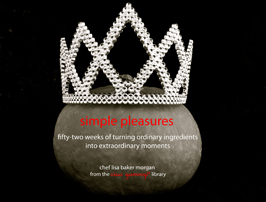
Mother’s Day 2013
speak carefully and carry a positive message
cherry granita
This week I had my first taste of an “empty nest.” My eldest, now a “tween,” visited Boston with her fifth grade class for a week. Her healthy separation from me and her eagerness to see the world and rely on her peers in a new way is bittersweet. Every year I write a Mother’s Day personal “recipe” for them. This year’s recipe was not only inspired by their rapid coming of age, but by two recent events. The first was the passing of our family matriarch (this year was the first time in our lives we did not celebrate her birthday and Mother’s Day jointly (at least, with her present)). The second was our Spring Break trip to Washington D.C. Both events reminded me of the importance of words, spoken, and unspoken. This week’s simple pleasure, and my annual Mother’s Day recipe for them, is a humble recipe for speaking with a little cherry granita on top (recipe below).

Ava and Julia,
to speak or not to speak that is the first question
Your Great-Grandmother was the embodiment of many, many lovely things. Unfailingly supportive, encouraging, loving, and thoughtfully spoken. Not one person who ever met her disliked her. No one could speak unkindly about her.
She was raised on a small farm in Illinois. She never graduated from High School. She never sought financial success or personal recognition. She was an old soul with a kind heart. She knew the value of things that mattered and the trivial nature of the things that do not. She touched the lives of many in her own way.
Your Great-Grandmother carefully weighed the impact of her comments and advice before she spoke. She approached people with sincerity. She was not confrontational, judgmental, or boastful. Being “right” was not important. Resolving conflict and comforting those who needed her took precedence. Of the many wise things she would say, she would always warn that: “Once you say the words you can never take them back.” When I was a lawyer, we used to say that you “cannot un-ring the bell once it was rung.” It is the same principle and Great-Grandma never had to go to law school to learn that lesson. Great-Grandma knew the power of words. You were blessed to have a Great-Grandmother and even more fortunate to have a Great-Grandmother who was a wise, strong woman and I hope that the examples of her life will stay with you all of yours.

the words and the message you are sending is the second question
In Washington D.C. we visited the Lincoln Memorial and stood at the feet of the seated statue of Abraham Lincoln. Surrounded by a great man’s words etched in stone – The Gettysburg Address on the left of us and Lincoln’s Second Inaugural Address on the right — I thought of the power of one person’s words.

Although the Civil War was soon to end in the Union’s favor, in his Second Inaugural Address Lincoln did not celebrate nor seek to punish the South. Rather, his words encouraged inclusion, restoration, and the rebuilding of a unified nation. It would have been easy for him to give the opposite message. He could have sought to make the South suffer further or celebrate the success of the Union. However, he did not. Rather, Lincoln was clear:
“With malice toward none with charity for all with firmness in the right as God gives us to see the right let us strive on to finish the work we are in to bind up the nation’s wounds to care for him who shall have borne the battle and for his widow and his orphan to do all which may achieve and cherish a just and lasting peace among ourselves and with all nations.”
It was a message of optimistic, encouragement, inclusion, forgiveness, and positive strength. It is a message that sought to heal a nation then. Lincoln’s positive words are applicable today.

On the steps in front of Abraham Lincoln’s statue is where Martin Luther King, Jr. delivered his historical “I have a Dream” speech on August 28, 1963 after leading the March on Washington. Martin Luther King, Jr.‘s message was similar to Lincoln’s in many ways. Dr. King advocated equal treatment and opportunity, hope, and advancement without revenge, punishment, or violence:
“Let us not seek to satisfy our thirst for freedom by drinking from the cup of bitterness and hatred. We must forever conduct our struggle on the high plane of dignity and discipline. We must not allow our creative protest to degenerate into physical violence.”
It would have been so easy to have gone the other way…it would have been understandable. However, he did not. Martin Luther King, Jr.’s words remain applicable and inspirational today.

***
I reference these three individuals this week because I have been thinking about one of my challenges as a mother and that is teaching you about speaking (the words you say, when you should not say anything, thinking before you speak…). Manners and polite words are the easy part. How to address your elders and how to speak respectfully are not difficult either. However, you are at an age where your skills of communication are being developed and tested not only on an academic level but on a social level (which seems to affect your day even more at this age). How do you comfort a friend or give them advice? When you are disappointed or angry at your friend, what do you say and when? What do you say when others are unkind to you and hurt your feelings? What do you say if you witness things that are wrong or unfair? How do you handle successes and defeats? It is different for you now. You are facing more mature situations. You are growing up.


Great-Grandma influenced our lives on a personal, familiar level. In contrast, Martin Luther King, Jr. and Abraham Lincoln influenced our lives on an indirect, historical level. There are fundamental lessons to learn from all three of these individuals. So, this year is a recipe for speaking and as you both approach the age where the language of your peers takes on a new significance, debate teams and social interaction are more relevant than before, and you develop your own voice and will test that voice out on your friends and your family, here is my humble recipe for speaking inspired by these three individuals:
- Choose your words carefully. It is said that the “pen is mightier than the sword.” Do not wound others with your words, intentionally or unintentionally. Think about your words and the impact they will have on the listener.
- Do not talk down to another person ever. It is disrespectful. It is presumptuous.
- Do not speak out of anger. Take time to reflect on your words. Do not be quick to advance an ending you really do not want just because you are feeling wounded or revengeful at that moment.
- Some things do not need to be said even if they are true. There is no reason to say to observational things that will hurt someone else. For example, you are entering a physically awkward stage. There is no reason to tell someone that their face is breaking out or their ears have grown faster than than head, even if it is true. You would be exploiting something they are probably already sensitive about. Why would you want to make that person feel worse? So don’t. Learn to have a filter.
- Compliment and congratulate others often.
- Take responsibility for your shortcomings and say you are sorry for your actions (and mean it).
- Never use the word “hate” (and do not have hate in your heart). It is normal to prefer some things over others, but there is no reason to “hate” anything.
- Do not criticize others. Recognize that your complaints about others are typically the things you dislike about yourself. Start with those first.
- Really listen to the words of others and never interrupt someone when they are talking. When you interrupt another before they have finished you are sending the message that what you have to say is more important than what they are saying. Moreover, how can you properly respond if you have not let them finish?
- Be respectful to others and to their feelings. Do not say something to hurt someone or for the purpose of making them feel unimportant or to make yourself feel better.
- Stand up against injustice for yourself and for others. Martin Luther King, Jr. once said, “Never, never be afraid to do what’s right especially if the well-being of a person or animal is at stake, society’s punishments are small compared to the wounds we inflict on our soul when we look the other way.”
- Never celebrate or triumph in the shortcomings or mistakes of others.
- Speak honestly and with conviction.
- Have a positive message. There is no reason to ever put negative words or negative energy into the world.
- Always address the issue at hand and never attack someone personally.
- If you are upset with someone, discuss what the action was that hurt you (i.e., when you did that, I thought it was an unkind thing to do and it hurt my feelings) rather than making the action the personality or characteristic of the other person (i.e., you are mean)
- Inclusion, not exclusion, should always be your goal.
- Remind me (respectfully) if my words fall short of my own list.
Should you have difficulty remembering this list, remember at least the following abbreviated passage. This was one of Great-Grandma’s favorite passages, taken from the same book both Martin Luther King, Jr. and Abraham Lincoln looked to for guidance and inspiration. If you reflect on these words, your heart will be in the right place and your words and actions will necessarily follow and be very much in the spirit of the three individuals mentioned here:
“Love is patient and kind; love does not envy or boast: it is not arrogant or rude. It does not insist on its own way; it is not irritable or resentful; it does not rejoice at wrongdoing, but rejoices with the truth. Love bears all things, believes all things, hopes all things, endures all things. Love never ends.. […] faith, hope, and love abide, these three; but the greatest of these is love.”
1 Corinthians 13:1-13 (English Standard Version)

***
The recipe that follows is one that you both loved as children. I first made it for you when you were teething. Seeing the cherry blossoms in Washington D.C. made me anxiously think of cherry recipes. Cherries arrived in the markets this week and Julia asked me to make her cherry “ice.” Good idea. The cherry granita recipe is not only simple to make but a nice parallel to the message about speech because food, like words, can be cold and icy, but when mixed with a little sugar, even the frostiest things are softened. Enjoy.
Love, Mom

cherry “ice” (granita)
serves 4-6
what you need:
1 pound fresh, delicious cherries, stems and pits removed.
½ cup granulated sugar
½ cup bottled water
1 teaspoon fresh lemon juice
fresh mint leaves (optional garnish)
how to:
- Purée cherries. Place cherries, water, sugar, and lemon juice in a food processor. Purée until smooth.
- Freeze And Scrape. Pour puréed cherries into a shallow pan (can be glass or metal). Cover with plastic and put in the freezer. After one hour, scrape the ice with a fork to break it up. Cover and return ice to the freezer. After 30 minutes (or longer), repeat the scraping process. Return to the freezer.
- Serve. Spoon cherry granita into dishes. Garnish with fresh mint leaves. Serve with fresh cherries.
bon appétit

Tags: cherry granite, mother's day







Your e-mails, and recipes are always special, and this one is very profound and inspirational. Thanks for sharing your special talents with all of us.
I am humbled by your comment. Thank you. It is always my pleasure. LM
[…] Mother’s Day 2013. The power of words; Recipe : cherry granita […]